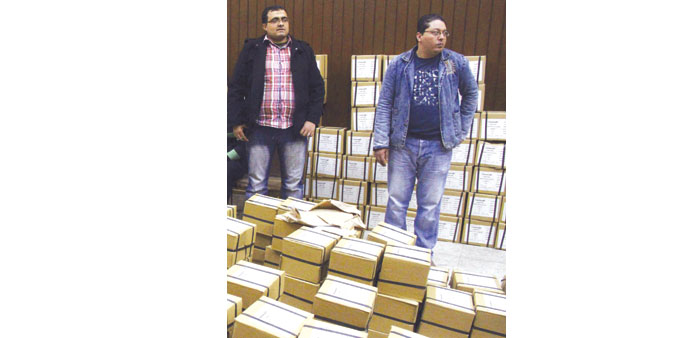Election officials stand near boxes containing voting slips for the referendum on the new constitution in Cairo yesterday.
DPA/Cairo
Egyptian Islamists campaigning for a boycott of a referendum on a military-backed draft constitution claimed low expatriate voter turnout as a victory yesterday, a day before domestic voting starts.
But well over 90% of those who did turn out over five days of voting at Egyptian embassies worldwide reportedly backed the constitution, setting the stage for two days of polling where the real battleground will be not the result, but how many turn out.
Army chief Abdel-Fattah al-Sisi and interim President Adly Mansour have both made high-profile calls for people to come out and vote on the charter, which was drawn up after the military deposed Islamist president Mohamed Mursi in the wake of massive opposition demonstrations six months ago.
With Mursi’s backers calling for a boycott, the Islamists and the new authorities both see the final turnout figures as a key test for their rival claims to legitimacy.
“The putschists have lost another round ... with the resounding fall of their invalid black charter under the feet ... of the Egyptians abroad, and your turn has come at home,” the Islamist National Alliance in Support of Legitimacy said in a communique.
Egyptian diplomatic missions in Saudi Arabia, Britain, France and Austria all recorded yes votes of about 98% in the referendum. But turnout was low, state-run newspaper Al Ahram reported yesterday.
Of 681,000 registered overseas voters, 103,000 cast ballots, Supreme Electoral Commission head Hisham Mukhtar announced. That was less than the 240,000 who voted in a 2012 referendum that approved an Islamist-drafted constitution during Mursi’s presidency.
The lower numbers voting were because voters had to go to embassies and consulates in person, while postal votes were not accepted on this occasion, Mukhtar said.
He added that more voters had actually turned up at the missions than in 2012, when most expatriate voters cast postal ballots.
Mukhtar did not confirm the reported figures for yes and no votes, saying they would be announced after the close of polls tomorrow, with the final results due within three days.
Al Ahram reported that only 23,651 votes were cast in Saudi Arabia, where more than 300,000 Egyptian expatriates are registered to vote – 45% of the global total.
Liberal and leftist parties, as well as Egypt’s state media, private sector broadcasters, and business groups have all pushed for a yes vote.
One of the few groups calling for a no vote - the centrist Strong Egypt party headed by former Muslim Brotherhood leader Abdel-Moneim Abul-Fotouh - said that it was “withdrawing definitively from the referendum process”, citing harassment of its activists by security forces and what it said were shortcomings in the electoral arrangements.
Human Rights Watch criticised the recent arrests of seven Strong Egypt members who had been putting up posters calling for a no vote.
“Egyptian citizens should be free to vote for or against the new constitution, not fear arrest for simply campaigning for a ‘no’ vote,” said Joe Stork, Middle East and North Africa deputy director for the US-based rights group.
The group published testimony from some of the arrested activists in which they recounted being interrogated by secret police and beaten.
The streets of Cairo were quiet ahead of the referendum, as the country celebrated a public holiday marking the birth of Prophet Muhammad.
Army spokesman Colonel Ahmed Ali announced that 160,000 officers and troops had been deployed across the country to provide security for the referendum.
In the restive Sinai Peninsula, eight local Muslim Brotherhood members were arrested as part of a campaign to make the voting process more secure, a senior police official said.
North Sinai security director Samih Bishadi said that the eight, along with five others arrested on Sunday, were “dangerous members involved in organising demonstrations”.

